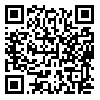Volume 37, Issue 150 (November 2024)
IJN 2024, 37(150): 336-349 |
Back to browse issues page
Download citation:
BibTeX | RIS | EndNote | Medlars | ProCite | Reference Manager | RefWorks
Send citation to:



BibTeX | RIS | EndNote | Medlars | ProCite | Reference Manager | RefWorks
Send citation to:
Fouladi talari M, Neisani Samani L, kheyrkhah M, Haghani S. Work-related Stress and Attitude Towards Childbearing in Married Female Employees of Hospitals Affiliated to Iran University of Medical Sciences. IJN 2024; 37 (150) :336-349
URL: http://ijn.iums.ac.ir/article-1-3796-en.html
URL: http://ijn.iums.ac.ir/article-1-3796-en.html
1- Department of Midwifery Education, Faculty of Nursing and Midwifery, Iran University of Medical Sciences, Tehran, Iran.
2- Department of Midwifery, Faculty of Nursing and Midwifery, Iran University of Medical Sciences, Tehran, Iran. ,neisanisamani.l@iums.ac.ir
3- Department of Midwifery and Reproductive Health, Nursing and Midwifery Research Center, School of Nursing and Midwifery, Iran University of Medical Sciences, Tehran, Iran.
4- Educational Group of Biological Statisticst, Nursing and Midwifery Care Research Center, Faculty of Nursing and Midwifery, Iran University of Medical Sciences, Tehran, Iran.
2- Department of Midwifery, Faculty of Nursing and Midwifery, Iran University of Medical Sciences, Tehran, Iran. ,
3- Department of Midwifery and Reproductive Health, Nursing and Midwifery Research Center, School of Nursing and Midwifery, Iran University of Medical Sciences, Tehran, Iran.
4- Educational Group of Biological Statisticst, Nursing and Midwifery Care Research Center, Faculty of Nursing and Midwifery, Iran University of Medical Sciences, Tehran, Iran.
Abstract: (1749 Views)
Background & Aims Today, delayed childbearing has become one of the most common patterns of reproductive behavior in the world. The first important factor in the formation of fertility intention is the person's attitude towards childbearing. This study aims to investigate the work-related stress and attitude towards childbearing in married women working in the hospitals affiliated to Iran University of Medical Sciences (IUMS), Tehran, Iran.
Materials & Methods This is a cross-sectional correlational study conducted from August to December 2023 on 470 married female employees of hospitals affiliated to the IUMS, who were selected by a quota random sampling method. The data collection tools included a sociodemographic form, the health and safety executive (HSE) questionnaire, and Söderberg et al.’s attitudes toward fertility and childbearing scale (AFCS). Pearson's correlation test, independent t-test, and analysis of variance were used to analyze the data in SPSS v.20 software.
Results The mean AFCS score was 65.89±12.24, and the mean HSE score was 106.08 ± 23.76. Among the HSE domains, the control domain had the highest score, and the peer support domain had the lowest score. The total HSE score (r=-0.684, P<0.001) and all its dimensions had a negative and significant relationship with the AFCS score (P<0.05). The AFCS score was significantly different based on shift work (P=0.002), employment status (P=0.035), number of children (P=0.015), having a job in other hospitals (P=0.004), and monthly income (P<0.001). The HSE score was significantly different based on work shift (P<0.001) and number of children (P=0.010). Job satisfaction had a significant relationship with the AFCS and HSE scores (P<0.001).
Conclusion Work-related stress can reduce the attitude of married female employees of hospitals towards childbearing. Since job satisfaction can improve this attitude, hospital managers should pay attention to this factor and use effective educational interventions to reduce their work-related stress and increase their positive attitudes towards childbearing.
Materials & Methods This is a cross-sectional correlational study conducted from August to December 2023 on 470 married female employees of hospitals affiliated to the IUMS, who were selected by a quota random sampling method. The data collection tools included a sociodemographic form, the health and safety executive (HSE) questionnaire, and Söderberg et al.’s attitudes toward fertility and childbearing scale (AFCS). Pearson's correlation test, independent t-test, and analysis of variance were used to analyze the data in SPSS v.20 software.
Results The mean AFCS score was 65.89±12.24, and the mean HSE score was 106.08 ± 23.76. Among the HSE domains, the control domain had the highest score, and the peer support domain had the lowest score. The total HSE score (r=-0.684, P<0.001) and all its dimensions had a negative and significant relationship with the AFCS score (P<0.05). The AFCS score was significantly different based on shift work (P=0.002), employment status (P=0.035), number of children (P=0.015), having a job in other hospitals (P=0.004), and monthly income (P<0.001). The HSE score was significantly different based on work shift (P<0.001) and number of children (P=0.010). Job satisfaction had a significant relationship with the AFCS and HSE scores (P<0.001).
Conclusion Work-related stress can reduce the attitude of married female employees of hospitals towards childbearing. Since job satisfaction can improve this attitude, hospital managers should pay attention to this factor and use effective educational interventions to reduce their work-related stress and increase their positive attitudes towards childbearing.
Type of Study: Research |
Subject:
Midwifery
Received: 2024/03/12 | Accepted: 2024/10/1 | Published: 2024/10/31
Received: 2024/03/12 | Accepted: 2024/10/1 | Published: 2024/10/31
Send email to the article author
| Rights and permissions | |
 |
This work is licensed under a Creative Commons Attribution-NonCommercial 4.0 International License. |







